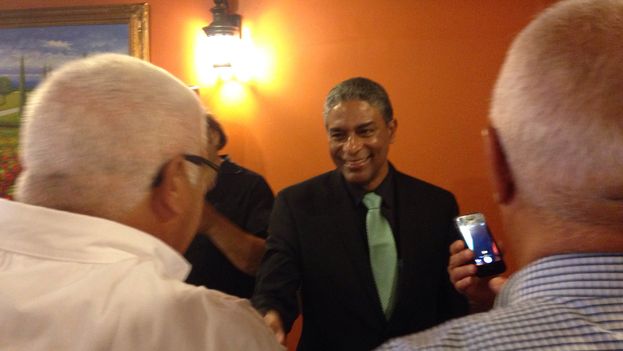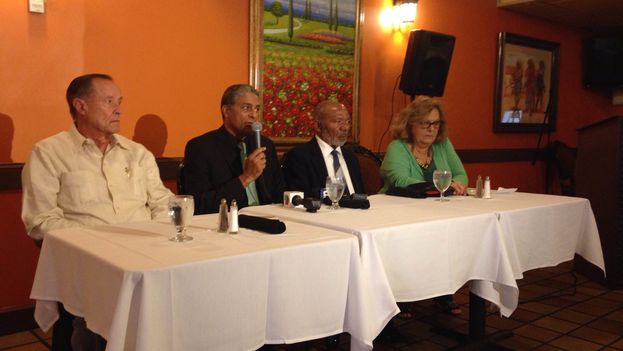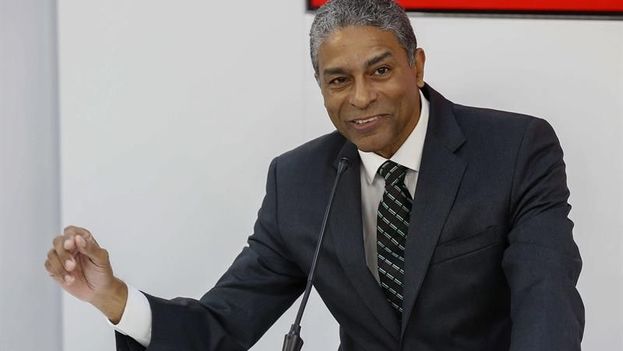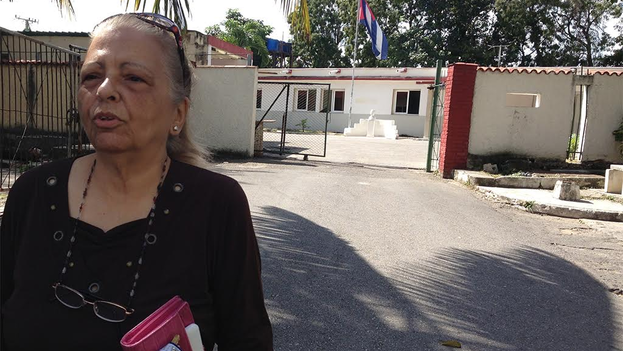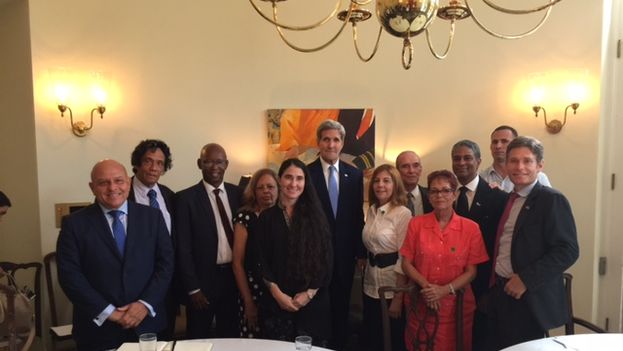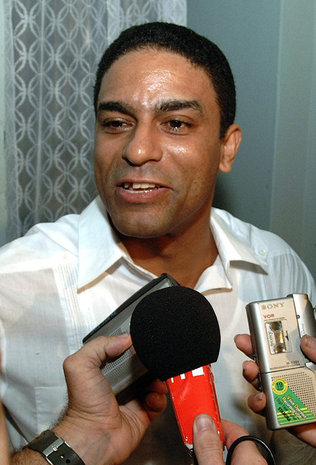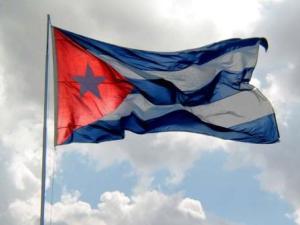“They have tried to psychologically assassinate my father”
By Joan Antoni Guerrero Vall
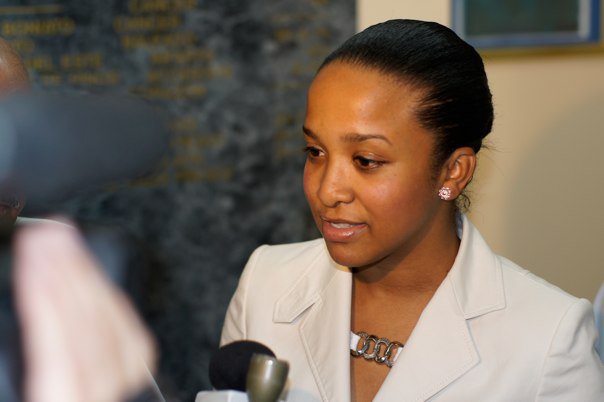
Winnie Biscet is the only daughter of the political prisoner Oscar Elias Biscet. During the last few days, she has been setting up a campaign to collect signatures for the release of her father. In this interview, she talks to us about her father’s career, about the conditions he has had to live under throughout the last 10 years of confinement, and about the unjust nature of his prison sentence. Strongly religious, Biscet’s daughter, who lives in the United States, is convinced that her father will be released from jail and will continue fighting, from the Island, to finally see a democratic Cuba, despite the lingering possibility that the regime could easily jail him once again.
How long has Óscar Elías Biscet been imprisoned? What were the reasons for his imprisonment?
My father was jailed because he was against the practice of abortions in Cuba. He was defending the human being, that being still in the stomach of a mother, the being which hasn’t even been born yet. That’s why he was condemned to three years in prison. Once he actually completed that three year sentence, he left jail, only to once again be imprisoned 36 days after, this time being sentenced to 25 years.
Did this occur in 2003?
Yes, during the Black Spring. They jailed him before the prisoners of the Group of the 75. In reality, he wasn’t exactly from that group. He was already jailed before that, though they did hold a trial for him together with the 75.
What interactions or communications has he had with his family during all this time?
Family members are allowed to visit him every two months. Those who are allowed are his brother, his father, his mother, his wife, and his kids. However, since I am an only child and I don’t live in Cuba, his cousins or his niece can visit him.
You left Cuba after this last imprisonment?
Yes. I left Cuba after he was sentenced to 25 years.
Have you been able to go back to visit him?
I was able to return in 2006 and I was able to see him twice.
What did he transmit to you during those last visits, and what has he communicated to you within the last couple of months?
My dad has always written letters to me which state that he is there for a cause, and that cause is human rights, rights for Cubans, for the right of that child which hasn’t even been born yet. He has always tried to explain to me how to be a better person, how to confront those people who don’t understand why he is in jail, and what is his purpose.
In the petition, your dad’s character is relayed as a symbol…
I think that my dad is a symbol because of all that he has done. He has been a firm patriot. He always has an answer, he thinks things through very well, each of his steps are calculated well. He is a person who has thoroughly studied himself, learning to control himself to not offend or hurt anyone. I believe that all the things my father has done has been in the form of a teacher, with others seeing him from a student’s perspective, wanting to do the same thing. He has been able to reach a position that many other people can’t, not because they are not qualified or dumb, but because each person has their own calling. And my father has done a lot of things that other people have not been able to. He is a person who defends life, he likes just causes, and defends things with all his heart and passion, down to the very last consequence. That’s why I think he is a symbol worth following.
Today, the European Union’s Common Position towards Cuba is up for debate. It was expected that those prisoners who have chosen not to leave Cuba were supposed to be released. Do you have hope that the regime will fulfill its promise?
Yes. I strongly believe in God, and I know that God will not let us down. I know that the only thing my dad has done has been to defend freedom in Cuba. He has never used a gun, he has never hurt anyone, he hasn’t offended anyone, and I think that when a person is just and sincere, then God will give him the power to succeed. And, like I’ve always said, my dad is a very Christian person, he trusts and has faith. And I know he will come out of jail, because God has taken note of all the good things he has done throughout his life, and like I say, when one is the son of God, he will never leave you alone. I have lots of faith that he will be released, that he will be home soon with his family, and that I will see him soon.
There were some rumors going around that this weekend various prisoners would be released. Has your dad been notified of such news?
I sincerely do not have an answer to that. What I can say is that his name is on the list of those who will be released. I don’t know if it will be today or in a month, but I am very sure that he will be released.
Once liberated from prison, and if he keeps up his political activities, do you think that the regime would be tolerant with him from now on?
No, I don’t believe that. I think he very well knows what awaits him. Ever since he was jailed ten years ago, he is very aware that he lives with the possibility of being jailed again and again, but like I say, when you have God in your heart, even if there is a president or anyone that wants to harm you, you will always make it through whatever awaits you. My dad is a very studious person, he is very strong, he has a very strong personality, and he thinks things through very well before acting. And I know that he knows what awaits him. But when God is in your heart, anything can be achieved. And he hasn’t harmed anyone, he hasn’t killed anyone, he simply wants a free Cuba. If the government doesn’t like that, well, I really don’t know what I can tell you. I just know that my dad has not harmed anyone and that the only thing we are demanding from the Cuban government is that they release him, because he is a Cuban just like the rest of us. He is a very dignified man. All that he says he says with much authority because he knows what he is talking about. In prison, he has been subjected to all sorts of tortures and absurdities on behalf of the government, simply for defending his brothers, his fellow Cubans.
Throughout these past ten years, what moment has been the most difficult for your father while in jail?
My father has been imprisoned for ten years, and if you ask me, every single second of that confinement must be difficult for him. He has not told me exactly what he has gone through, but being his daughter and because I am a strong believer in God, I have placed him in my heart and I can feel that he has suffered greatly at every moment. He has written some letters to me that can make anyone cry. He has seen lots of injustices in prison, people who have committed suicide for example, and that is very difficult. Once, he told me that they wanted to psychologically kill him. And it’s true. When someone is locked up in a punishment cell, that is what the intent is — to try to kill you mentally. My father knows this too well. I know that he has suffered throughout his life, but he is an honorable man who finds himself locked away because he is committed to the freedom of his country. Even before he has been in prison, he has still suffered, for they have tried many times to knock him down. But like I’ve told you, when you keep God in your heart, anything is possible, and no one can ever counter God — not Fidel, not the Revolution, no one.
You mentioned torture. What kind of tortures did your dad suffer?
For one, they have tried to drill absurd statements into his head, like foul words, or telling him that he is going crazy, that he will not be able to continue fighting, or that he is worth nothing. You know, those things damage people. Another thing they did was to strip from him his medical license. Imagine just how much he sacrificed to become someone in life, and then a person who is not even your relative or anything comes and snatches from him his title as a doctor. It’s horrible. He was a doctor who saved lives, who cared about his patients, and now they don’t let him exercise his profession. My dad has lived through some cruel things. Once, they punched him and he lost a tooth. Something like that is physical abuse, but can you imagine that he actually remained silent and took it in, that’s what it means to be a respectful and dignified person. He didn’t fire back with a punch because he respects his brothers. My dad knows when he is wrong or not when chatting with another person. And I think it’s absurd that a man be punched, to the point of loosing a tooth, just for thinking differently. Despite all these injustices which have landed upon him, he has not been violent.
Throughout these years, has his family faced obstacles in being able to see him in jail?
They have gone to jail to visit him. When I was in Cuba, though, sometimes they wouldn’t allow you to visit him for three to five months. I was very young, but I remember. It was frustrating because I had to go from Havana, where we used to live, all the way to Holguin. It was a 14 hour trip — a very difficult journey which would sometimes end with the guards refusing us to see him. It was very devastating for us, especially since I strongly wanted to see my dad, whom I love very much, and then they would just come out and flat out tell us that we couldn’t because he was being punished for having behaved badly. But we all know that in reality, he has never misbehaved. He has always respected people. The truth is that the things he does, they do not approve of. And when you’re against a government, then many harsh things tumble down after you.
Besides abortion, your father had some other ides which didn’t sit too well with the government…
He wanted his country to be free and democratic, like the United States. He strongly believed that if you wanted to go out and say “Down with Fidel”, then that was your right you wouldn’t suffer any repercussions for expressing your ideas. Also, if you wanted to build something, then you should be able to go ahead and do it. He considered the system to be very unjust, and that’s why he decided to fight for his country.
Who is helping you with this campaign and what is planned at the moment?
The campaign is organized by former political prisoners who suffered sentences of up to 28 years. They are amazing people who have decided to help with my campaign to free my father. The objective is the absolute freedom of Oscar Elias Biscet. I ask of everyone who reads this interview to please visit the blog (www.freedombiscet.wordpress.com) and sign the petition. It’s the only help we can ask for Oscar Elias Biscet, who only wanted freedom for himself and for the rest of Cuba. We want a free Cuba, with freedom of expression, of being able to do whatever we want to do without having any conflicting pressures. Please help us free my father.
See the original interview on the blog Punt de Vista, here.
October 28, 2010

![]() 14ymedio, Mario Penton, Havana/Miami, 11 January 2017 — While in the United States Rex Tillerson, Donald Trump’s nominee for Secretary of State, made it clear that human rights will be an important part of Washington’s policy toward Cuba, the island’s police forces carried out repressive actions in different parts of the country.
14ymedio, Mario Penton, Havana/Miami, 11 January 2017 — While in the United States Rex Tillerson, Donald Trump’s nominee for Secretary of State, made it clear that human rights will be an important part of Washington’s policy toward Cuba, the island’s police forces carried out repressive actions in different parts of the country.
